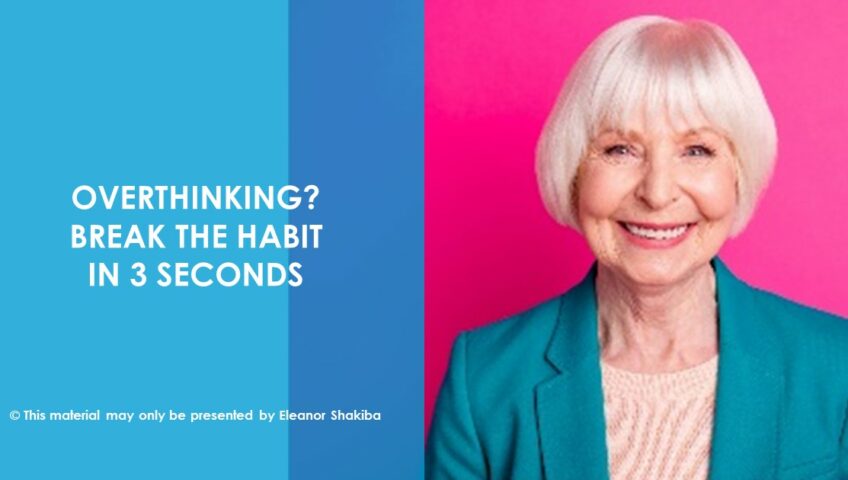Overthinking is a huge barrier to productivity and achievement. While it’s sensible to think things through, you can take this process too far. Signs you’ve move beyond critical thinking into rumination or overthinking include:
- Endlessly debating the pros and cons of an idea
- Continuously searching for new information, rather than making a decision
- Obsessing about small details
- Creating multiple scenarios about the future in your mind
- Taking much longer than your peers to make simple decisions
There are many triggers for overthinking. Behind most of them, though, runs a common theme. Fear of failure or social shame. Early childhood experiences can contribute to this type of fear. However, you’re not a child anymore. As an independent adult, you can choose to change your habits. And this includes the thinking habits that lead to rumination and procrastination.
Yes, overthinking is simply a habit. That habit might have formed as a way of protecting yourself from criticism, teasing or punishment. Seen this way, it’s a sensible strategy. But it doesn’t have to be your only strategy. If you’re finding overthinking is becoming a problem, it’s time to install some alternative behavioural options.
Fortunately, creating new habits is surprisingly simple. The key to success is finding behaviours you can substitute for the old ones. For example, imagine someone who is trying to quit eating biscuits during their tea break. Most people would try to change this habit by focusing on not eating biscuits. Brain smart people, though, would do something different. They’d substitute a healthy food (like fruit) for their old treat. Having an alternative readily available, would make it much easier to change behaviour in this situation.
Ditching your overthinking habit can be just as simple. So what’s the behaviour you need to adjust? Psychologists have shown it’s the process of thinking without pausing. Knowing this makes it simple to change. All you have to do is hit the pause button.
Stop a moment and think about that. Instead of letting your mind race, you need to find a moment of stillness. This breaks the cycle of rumination and catastrophic thinking. Technically, you’re doing a ‘pattern interruption’. In other words, you’re disrupting your habitual pattern of unhelpful thinking.
Once you’ve paused your thoughts, the next step is to redirect them. My favourite technique for doing this is the ‘3-2-1 strategy’. This simply involves counting down from 3 to 1 and then choosing your next action. There are three options to choose from.
- 3-2-1 act now
- 3-2-1 refuse
- 3-2-1 refer
As the name suggests, ‘3-2-1 act now’ involves taking immediate action. The point of this strategy is to move from procrastination to action mode. If this feels confronting, remember that if your first action doesn’t work, you can do something else. At least you’ve broken the pattern of indecisiveness that your previous thinking style created.
The ‘3-2-1 refuse’ strategy is used to say “no” to others’ requests or to discard unhelpful ideas before they waste too much time. Put this strategy to use by simply saying no and moving on to your preferred course of action.
Finally, the ‘3-2-1 refer’ strategy is useful when you need to seek others’ opinions or get expert advice. The idea here is to frame a question and seek answers from someone with subject matter expertise. It can save you hours of research because you will be going to someone who already knows the answer to your question.
So there you have it. Three simple ways to move from overthinking to productive action. Remember that your confidence will grow as you shift your mindset.
About the author: Eleanor Shakiba
Eleanor is a trainer and coach, with a passion for unleashing the power of positive deviance in talented people. She has taught more than 50,000 people how to excel professionally. An expert in the field of Positive Psychology, Eleanor is also qualified in Social Anthropology, Counselling, Coaching, Adult Education and Neuro Linguistic Programming. She specialises in helping HR and L&D practitioners to unleash the power of positive psychology in business. Her major focus in developing three key areas that support positive workplace cultures: positive mindset, proactive communication and purposeful leadership. Eleanor is the author of the Positive Psychology Toolkit for HR and L&D Practitioners. Download your free copy here.
